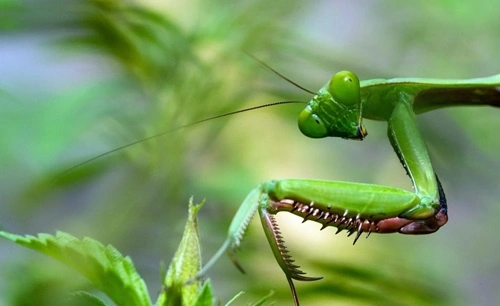No, it is not illegal to kill a praying mantis in Pennsylvania. Despite widespread myths that claim otherwise, there are no federal or state laws specifically protecting praying mantises. However, these insects play a beneficial role in the ecosystem, and conservationists encourage preserving them whenever possible.
The Myth of Praying Mantis Protection
The idea that killing a praying mantis is illegal has persisted for decades, but there is no legal basis for this belief. The confusion may stem from the mantis’s unique appearance and its reputation as a beneficial predator that controls pest populations. While it is not against the law to kill them, their ecological value makes it unwise to do so unnecessarily.
1. Legal Status of Praying Mantises in Pennsylvania
Praying mantises, including the native Carolina mantis and the introduced Chinese mantis, are not listed as endangered or protected species under federal or Pennsylvania state law. This means:
- You will not face legal penalties for harming or killing a mantis.
- They are not classified as a threatened or endangered species by the Pennsylvania Game Commission or under the Endangered Species Act (ESA).
2. Ecological Importance of Praying Mantises
While killing a praying mantis is not illegal, it is strongly discouraged due to their significant ecological role:
- Pest Control: Mantises feed on harmful insects such as aphids, flies, and caterpillars, making them natural pest controllers for gardens and farms.
- Biodiversity Maintenance: They contribute to ecological balance by being both predators and prey in the food chain.
- Pollination Support: Mantises sometimes consume pollinators like bees and butterflies, but this is a small fraction of their diet and does not outweigh their benefits.
3. Cultural Significance
The praying mantis has symbolic importance in many cultures, representing patience, mindfulness, and good fortune. This symbolism may contribute to the myth of legal protection, as people often associate them with positive traits and assume they are protected by law.
4. When Killing a Praying Mantis May Be Necessary
Although unnecessary killing of praying mantises is discouraged, there are rare situations where it might be considered:
- Infestation of Non-Native Species: Non-native mantises, like the Chinese mantis and European mantis, can outcompete native species and disrupt local ecosystems. In such cases, managing their populations may be justified.
- Human Safety Concerns: While rare, mantises could inadvertently enter homes or areas where they are unwanted. In these cases, relocation is preferred over killing.
5. How to Handle a Praying Mantis Encounter
Relocation
If you find a praying mantis in an unwanted area, gently move it to a safer environment using a container or gardening gloves. Mantises are non-aggressive and harmless to humans.
Support Garden-Friendly Practices
To encourage praying mantises in your garden:
- Avoid using pesticides, which can harm mantises and their prey.
- Provide a habitat with diverse vegetation for shelter and hunting.
6. Conservation and Education Initiatives
While praying mantises are not endangered, educational campaigns emphasize their role in sustainable agriculture and ecosystem health. The Pennsylvania Department of Agriculture promotes natural pest control methods, highlighting the mantis as a beneficial predator.
Recent Updates (2023-2024)
1. Increasing Focus on Native Species
Conservation efforts in Pennsylvania are emphasizing the protection of native mantis species like the Carolina mantis, which face competition from invasive mantis species.
2. Public Education
Programs by local conservation groups and agricultural extension offices aim to dispel myths about mantis protection laws and encourage their preservation through non-lethal means.
3. Climate Change Impact
Rising temperatures and habitat changes are affecting mantis populations, leading to shifts in their distribution. Conservationists are monitoring these changes to ensure ecological balance.
FAQs About Killing Praying Mantises in Pennsylvania
Q1. Is it illegal to kill a praying mantis in Pennsylvania?
Ans: No, there are no laws protecting praying mantises in Pennsylvania or federally.
Q2. Why is there a myth that killing a mantis is illegal?
Ans: The myth likely stems from their ecological importance and cultural symbolism, which make people assume they are protected.
Q3. Are praying mantises endangered?
Ans: No, praying mantises are not endangered in Pennsylvania, but native species like the Carolina mantis face competition from non-native species.
Q4. What should I do if I see a praying mantis?
Ans: If it is not causing harm, leave it undisturbed. If it is in an unwanted location, consider relocating it to a garden or natural area.
Q5. Are all mantises in Pennsylvania native?
Ans: No, Pennsylvania is home to both native species, like the Carolina mantis, and non-native species, such as the Chinese and European mantises.

